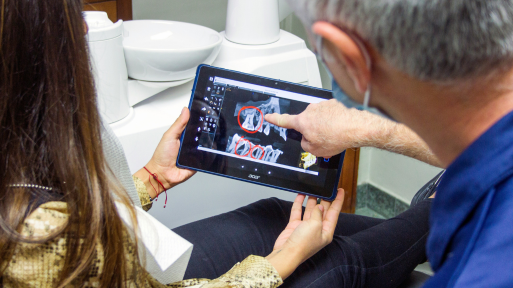How to Care for Your Child’s First Teeth: A Guide for Parents
 Your child’s first teeth, also known as baby teeth or primary teeth, are a significant milestone in their development. While they are temporary, these teeth play a crucial role in your child's oral health, speech development, and overall well-being. Proper care for these early teeth sets the foundation for healthy adult teeth and lifelong oral hygiene habits. In this blog post, we’ll explore how to care for your child’s first teeth and establish a strong oral care routine right from the start.
Your child’s first teeth, also known as baby teeth or primary teeth, are a significant milestone in their development. While they are temporary, these teeth play a crucial role in your child's oral health, speech development, and overall well-being. Proper care for these early teeth sets the foundation for healthy adult teeth and lifelong oral hygiene habits. In this blog post, we’ll explore how to care for your child’s first teeth and establish a strong oral care routine right from the start.
Why Baby Teeth Matter
Baby teeth are essential for several reasons:
- Chewing and Nutrition: They help your child chew food properly, which is vital for their nutrition and growth.
- Speech Development: Baby teeth assist in the development of clear speech and proper pronunciation.
- Guiding Permanent Teeth: They hold space for the permanent teeth and guide them into the correct position as they grow.
- Building Healthy Habits: Establishing good oral hygiene habits early on promotes a lifetime of healthy smiles.
Common Causes of Bad Breath and How to Fix Them
 Bad breath, also known as halitosis, is an unpleasant condition that can cause discomfort and embarrassment. It can affect anyone at any age and is often a sign of an underlying issue with oral hygiene or overall health. The good news is that, in most cases, bad breath can be improved or eliminated with proper care and attention. In this blog post, we'll explore the common causes of bad breath and provide practical tips on how to fix them.
Bad breath, also known as halitosis, is an unpleasant condition that can cause discomfort and embarrassment. It can affect anyone at any age and is often a sign of an underlying issue with oral hygiene or overall health. The good news is that, in most cases, bad breath can be improved or eliminated with proper care and attention. In this blog post, we'll explore the common causes of bad breath and provide practical tips on how to fix them.
Common Causes of Bad Breath
Poor Oral Hygiene
One of the most common causes of bad breath is poor oral hygiene. When you don’t brush and floss regularly, food particles can remain in your mouth, leading to the growth of bacteria. This bacterial buildup, along with plaque and tartar on your teeth and gums, produces unpleasant odors.
- Solution: Brush your teeth at least twice a day and floss daily to remove food particles and plaque. Use a tongue scraper or brush your tongue to remove bacteria that can cause bad breath.
Are Regular Professional Teeth Cleanings Necessary?
 When it comes to maintaining oral health, regular brushing and flossing at home are essential. However, many people wonder if visiting the dentist for professional teeth cleanings is truly necessary. After all, if you’re diligent with your at-home oral care routine, isn't that enough? The short answer is: No, it's not. Professional teeth cleanings play a crucial role in keeping your teeth and gums healthy, preventing dental problems, and ensuring overall oral health. In this blog post, we’ll explore why regular professional teeth cleanings are necessary and what benefits they offer.
When it comes to maintaining oral health, regular brushing and flossing at home are essential. However, many people wonder if visiting the dentist for professional teeth cleanings is truly necessary. After all, if you’re diligent with your at-home oral care routine, isn't that enough? The short answer is: No, it's not. Professional teeth cleanings play a crucial role in keeping your teeth and gums healthy, preventing dental problems, and ensuring overall oral health. In this blog post, we’ll explore why regular professional teeth cleanings are necessary and what benefits they offer.
What Happens During a Professional Teeth Cleaning?
A professional teeth cleaning, also known as a dental prophylaxis, is typically performed by a dental hygienist. During the cleaning, the hygienist will:
- Remove Plaque and Tartar: Even with meticulous brushing and flossing, plaque can build up on your teeth, especially in hard-to-reach areas. Over time, this plaque hardens into tartar (calculus), which can only be removed with professional dental tools.
- Deep Cleaning: The hygienist will clean both above and below the gumline to remove any plaque and tartar that may have accumulated. This deep cleaning helps prevent gum disease.
- Polish Teeth: After the plaque and tartar are removed, your teeth are polished to remove surface stains and make it harder for plaque to adhere to your teeth in the future.
- Fluoride Treatment (Optional): Some dental cleanings include a fluoride treatment to strengthen the enamel and protect against cavities.
Why Your Gums Might Be Bleeding
 Experiencing bleeding gums can be alarming, especially if you're unsure about the cause. Bleeding gums are a common dental issue and can be a sign of various underlying conditions. Understanding the potential causes of bleeding gums and how to address them is essential for maintaining good oral health. In this blog post, we will explore the common reasons why your gums might be bleeding and provide tips on how to keep your gums healthy.
Experiencing bleeding gums can be alarming, especially if you're unsure about the cause. Bleeding gums are a common dental issue and can be a sign of various underlying conditions. Understanding the potential causes of bleeding gums and how to address them is essential for maintaining good oral health. In this blog post, we will explore the common reasons why your gums might be bleeding and provide tips on how to keep your gums healthy.
Common Causes of Bleeding Gums
Gingivitis
Gingivitis is the most common cause of bleeding gums. It is the early stage of gum disease and is characterized by inflammation of the gums due to plaque buildup along the gumline.
- Symptoms: Red, swollen, and tender gums that bleed easily when brushing or flossing.
- Solution: Improve your oral hygiene routine by brushing twice a day, flossing daily, and using an antiseptic mouthwash. Regular dental cleanings and check-ups are also crucial.
The Importance of Dental X-Rays
 Dental X-rays are a fundamental tool in modern dentistry, offering a detailed view of your oral health that is not visible to the naked eye. These images help dentists diagnose, treat, and monitor a wide range of dental issues effectively. In this blog post, we will explore the importance of dental X-rays, how they work, and why they are essential for maintaining your overall oral health.
Dental X-rays are a fundamental tool in modern dentistry, offering a detailed view of your oral health that is not visible to the naked eye. These images help dentists diagnose, treat, and monitor a wide range of dental issues effectively. In this blog post, we will explore the importance of dental X-rays, how they work, and why they are essential for maintaining your overall oral health.
What Are Dental X-Rays?
Dental X-rays, also known as radiographs, are a type of imaging that allows dentists to see beneath the surface of your teeth and gums. Using a small amount of radiation, these images capture the internal structure of your teeth, roots, jawbones, and surrounding tissues. There are several types of dental X-rays, including:
- Bitewing X-Rays: These show the crowns of your upper and lower teeth and are useful for detecting cavities and checking the fit of dental restorations.
- Periapical X-Rays: These provide a view of the entire tooth, from the crown to the root, and are used to detect issues below the gum line, such as abscesses or cysts.
- Panoramic X-Rays: These capture a broad view of your entire mouth, including the jaws, teeth, sinuses, and temporomandibular joints, and are helpful for assessing overall oral health and planning treatments.
- Occlusal X-Rays: These show the floor of the mouth and are used to examine tooth development and placement in children.
The Impact of Stress on Your Oral Health
 In today's fast-paced world, stress has become an almost ubiquitous part of daily life. While we often recognize the impact of stress on our mental and physical well-being, its effects on oral health are frequently overlooked. However, chronic stress can lead to a variety of dental problems that can compromise your oral health and overall quality of life. In this blog post, we will explore how stress affects your oral health, identify common stress-related dental issues, and provide tips on how to manage stress to maintain a healthy mouth.
In today's fast-paced world, stress has become an almost ubiquitous part of daily life. While we often recognize the impact of stress on our mental and physical well-being, its effects on oral health are frequently overlooked. However, chronic stress can lead to a variety of dental problems that can compromise your oral health and overall quality of life. In this blog post, we will explore how stress affects your oral health, identify common stress-related dental issues, and provide tips on how to manage stress to maintain a healthy mouth.
How Stress Affects Your Oral Health
Stress can influence your oral health in several ways, often leading to behaviors and physiological responses that negatively impact your teeth and gums. Here are some of the primary ways stress affects your oral health:
Teeth Grinding and Clenching (Bruxism)
One of the most common responses to stress is bruxism, or the habitual grinding and clenching of teeth. This often occurs unconsciously, especially during sleep. Bruxism can lead to:
- Tooth Wear and Damage: Excessive grinding can wear down the enamel, leading to tooth sensitivity, fractures, and even tooth loss.
- Jaw Pain and Temporomandibular Joint (TMJ) Disorders: Chronic clenching and grinding can cause pain and discomfort in the jaw, leading to TMJ disorders that affect the functionality of the jaw joint.
- Headaches and Earaches: The tension from bruxism can also result in frequent headaches and earaches, further impacting your quality of life.
Oral Health Tips for Seniors
 As we age, maintaining oral health becomes increasingly important, yet often more challenging. Seniors face unique dental issues due to changes in their bodies, medications, and overall health. Proper oral care is crucial not only for preserving teeth and gums but also for overall well-being. In this blog post, we will provide practical oral health tips for seniors to help maintain a healthy smile and prevent common dental problems associated with aging.
As we age, maintaining oral health becomes increasingly important, yet often more challenging. Seniors face unique dental issues due to changes in their bodies, medications, and overall health. Proper oral care is crucial not only for preserving teeth and gums but also for overall well-being. In this blog post, we will provide practical oral health tips for seniors to help maintain a healthy smile and prevent common dental problems associated with aging.
Keep Up with Regular Dental Visits
Regular dental check-ups are essential for detecting and addressing oral health issues early. Seniors should visit their dentist at least twice a year for cleanings and examinations.
- Professional Cleanings: Regular cleanings remove plaque and tartar that cannot be eliminated by brushing and flossing alone.
- Oral Examinations: Dentists can identify early signs of dental problems such as cavities, gum disease, and oral cancer, ensuring prompt treatment.
The Risks of DIY Dental Treatments
 In recent years, the rise of do-it-yourself (DIY) dental treatments has surged, driven by social media trends and a desire to save money. From at-home whitening kits to DIY braces, many people are attempting to manage their dental care independently. However, while DIY dental treatments may seem convenient and cost-effective, they come with significant risks that can lead to long-term damage and costly professional intervention. In this blog post, we will explore the dangers of DIY dental treatments and emphasize the importance of seeking professional dental care.
In recent years, the rise of do-it-yourself (DIY) dental treatments has surged, driven by social media trends and a desire to save money. From at-home whitening kits to DIY braces, many people are attempting to manage their dental care independently. However, while DIY dental treatments may seem convenient and cost-effective, they come with significant risks that can lead to long-term damage and costly professional intervention. In this blog post, we will explore the dangers of DIY dental treatments and emphasize the importance of seeking professional dental care.
1. Improper Teeth Whitening
One of the most popular DIY dental treatments is at-home teeth whitening. While over-the-counter whitening kits are available, many people are turning to unregulated products and homemade remedies to achieve a brighter smile. The risks associated with DIY teeth whitening include:
- Enamel Damage: Using high concentrations of bleaching agents or abrasive materials can erode tooth enamel, leading to increased sensitivity and a higher risk of cavities.
- Gum Irritation: Improper application of whitening agents can cause chemical burns and irritation to the gums, resulting in pain and potential infection.
- Uneven Results: Without professional supervision, achieving uniform whitening can be difficult, leading to patchy or streaky results that detract from your smile.
The Importance of Wearing a Mouthguard for Sports
 Whether you’re a professional athlete or just enjoy recreational sports, protecting your teeth and mouth should be a top priority. Sports-related injuries are a leading cause of dental trauma, but many of these injuries can be prevented by wearing a mouthguard. In this blog post, we will discuss the importance of wearing a mouthguard for sports, the different types available, and tips for choosing the right one to ensure your smile and overall oral health stay intact.
Whether you’re a professional athlete or just enjoy recreational sports, protecting your teeth and mouth should be a top priority. Sports-related injuries are a leading cause of dental trauma, but many of these injuries can be prevented by wearing a mouthguard. In this blog post, we will discuss the importance of wearing a mouthguard for sports, the different types available, and tips for choosing the right one to ensure your smile and overall oral health stay intact.
Why Wearing a Mouthguard is Crucial
1. Prevents Dental Injuries
Mouthguards are designed to absorb and distribute the force of impact, significantly reducing the risk of broken teeth, knocked-out teeth, and other dental injuries. Whether it's a stray elbow during a basketball game or a fall while skateboarding, a mouthguard can be the difference between a minor injury and a dental emergency.
2. Protects Soft Tissues
A mouthguard not only shields your teeth but also protects the soft tissues in your mouth, such as your lips, cheeks, and tongue. By providing a barrier between your teeth and the soft tissues, a mouthguard can help prevent cuts, bruises, and other injuries.
The Future of Dental Technology
 The field of dentistry has always been a blend of science and art, aiming to improve patients' oral health and enhance their smiles. As we look towards the future, dental technology is advancing at a rapid pace, promising to revolutionize the way we approach oral care. From cutting-edge diagnostic tools to innovative treatment methods, the future of dental technology is poised to make dental care more efficient, effective, and comfortable for patients. In this blog post, we'll explore some of the most exciting advancements in dental technology and how they are set to transform the industry.
The field of dentistry has always been a blend of science and art, aiming to improve patients' oral health and enhance their smiles. As we look towards the future, dental technology is advancing at a rapid pace, promising to revolutionize the way we approach oral care. From cutting-edge diagnostic tools to innovative treatment methods, the future of dental technology is poised to make dental care more efficient, effective, and comfortable for patients. In this blog post, we'll explore some of the most exciting advancements in dental technology and how they are set to transform the industry.
1. 3D Printing and Digital Dentistry
3D printing is revolutionizing many industries, and dentistry is no exception. The ability to create precise, custom dental appliances quickly and cost-effectively is one of the most significant benefits of 3D printing. This technology is being used to produce crowns, bridges, dentures, and even orthodontic aligners with remarkable accuracy.
- Custom Implants and Prosthetics: 3D printing allows for the creation of highly customized dental implants and prosthetics that fit perfectly in the patient’s mouth, improving comfort and functionality.
- Faster Turnaround Times: Traditional methods of creating dental appliances can take weeks. With 3D printing, this process is reduced to a matter of hours, enabling quicker treatment times for patients.
The Best Practices for Cleaning Dentures
 Dentures are a fantastic solution for those who have lost their natural teeth, providing not just the aesthetic appeal of a full smile but also the functional benefits of being able to eat and speak comfortably. However, just like natural teeth, dentures require proper care and cleaning to maintain their appearance and functionality. In this blog post, we will discuss the best practices for cleaning dentures, ensuring they stay in excellent condition and keep your smile bright and healthy.
Dentures are a fantastic solution for those who have lost their natural teeth, providing not just the aesthetic appeal of a full smile but also the functional benefits of being able to eat and speak comfortably. However, just like natural teeth, dentures require proper care and cleaning to maintain their appearance and functionality. In this blog post, we will discuss the best practices for cleaning dentures, ensuring they stay in excellent condition and keep your smile bright and healthy.
Why Cleaning Your Dentures is Crucial
Proper denture care is essential for several reasons:
- Oral Health: Plaque and food particles can accumulate on dentures, leading to bad breath, gum disease, and oral infections.
- Denture Longevity: Regular cleaning helps prevent staining, warping, and damage, extending the lifespan of your dentures.
- Comfort: Clean dentures fit better and are more comfortable to wear, preventing sore spots and irritation.
Daily Cleaning Routine
A consistent daily cleaning routine is vital for maintaining your dentures. Follow these steps for effective daily care:
- Rinse After Eating: After every meal, remove your dentures and rinse them under running water to eliminate food particles and debris. This helps prevent plaque buildup and staining.
- Brush Your Dentures: Use a soft-bristled toothbrush and a non-abrasive denture cleanser to brush all surfaces of your dentures. Avoid using regular toothpaste, as it can be too abrasive and may scratch your dentures. Be gentle to prevent damaging any parts of the dentures.
- Soak Overnight: Dentures need to stay moist to maintain their shape. Soak them in a denture cleaning solution or plain water overnight. Never use hot water, as it can cause dentures to warp. Follow the manufacturer's instructions for the soaking solution to ensure proper use.

